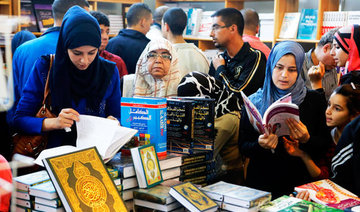ALGIERS: Algerian primary schools have scrambled to introduce English lessons, in a move critics say was rushed but others hope could be a coup de grace against the language of former occupier France.
Language is a sensitive topic in the North African country, where French is still widely spoken six decades after independence that followed 132 years of colonial rule and a grueling eight-year war.
“The French language is war booty, but English is the international language,” President Abdelmadjid Tebboune told journalists in July.
Only weeks earlier, he had ordered the Education Ministry to introduce English into primary school curricula by the new term, which started on Sept. 21.
This was the first stage in a broader plan to boost English tuition in the coming years.
The status of French has been a hotly debated issue for decades in Algeria, which has only Arabic and the Berbers’ Tamazight as official languages.
French infuses public life, is used for teaching science and business, and is spoken by millions of diaspora Algerians, particularly in France.
Yet it also evokes memories of colonial rule.
“I want to drop the language of the colonizer and adopt the language used worldwide,” said Hacene, the father of a primary pupil in the capital Algiers.
“Teaching English in primary school is sensible,” said Farouk Lazizi, whose two children are at primary school in Algiers.
But he said he has mixed feelings on the president’s decision, which had set up a race against the clock.
In less than two months, 5,000 new teachers were recruited and put on a fast-track training program, while a new manual had been written and distributed to schools in record time.
“We need to prepare things well, because most Algerian parents aren’t ready to teach English to their kids,” Lazizi said.
The Education Ministry said some 60,000 people applied for the new jobs, which require an undergraduate degree in English or translation.
Officials have argued that moves to bolster English tuition are motivated by practical concerns rather than ideology but haven’t offered an explanation for the tight schedule afforded for the change.
The process was so rushed that the state hired translators who “aren’t even trained to teach” to make up the shortfall in English-speaking teachers, said linguist Abderzak Dourari.
On top of Arabic and French, some schools in the country also teach Tamazight, which is spoken by millions of Algerians.
Some education specialists worry that even if the glitches are ironed out, the addition of yet another language to classrooms would still be challenging.
“Teaching four languages to primary school children will confuse them,” said Ahmed Tessa, a pedagogy expert and former English teacher.
The decision on primary schools is the latest move in a bitter struggle that has pitted conservatives who want French scrapped altogether against supporters of the language, who tend to be more secular.
Sadek Dziri of UNPEF, a powerful teachers’ union, welcomed what he called an “overdue” decision to adopt English, “the language of science and technology.”
“Algeria will be able to drop French, which is the language of the coloniser and hasn’t brought good results,” said one parent in Algiers who asked to remain anonymous.
Another said that Francophone Algerians “don’t approve of this decision” and want to keep French in schools.
Abdelhamid Abed, who teaches English at an Algiers middle school, argued that “French has done its time”.
“We shouldn’t see this question in terms of rivalry between French and English, but from a practical standpoint.”
But linguist Dourari said it would be hard to simply replace French with English, given Algeria’s history and its cultural and economic ties with France — including tourism.
“There’s an Algerian diaspora of more than eight million living in France,” he pointed out.
“There are mixed families, who come and go.”
Tessa insisted that President Tebboune’s “war booty” remark — made in the run-up to an August visit by France’s Emmanuel Macron — reflected the benefits Algeria has reaped from having French in its “institutional and socio-economic life”.
“Those who are hostile to French believed it would be dropped entirely from primary school curricula,” he said. “They’re dreaming of seeing it disappear.”





























